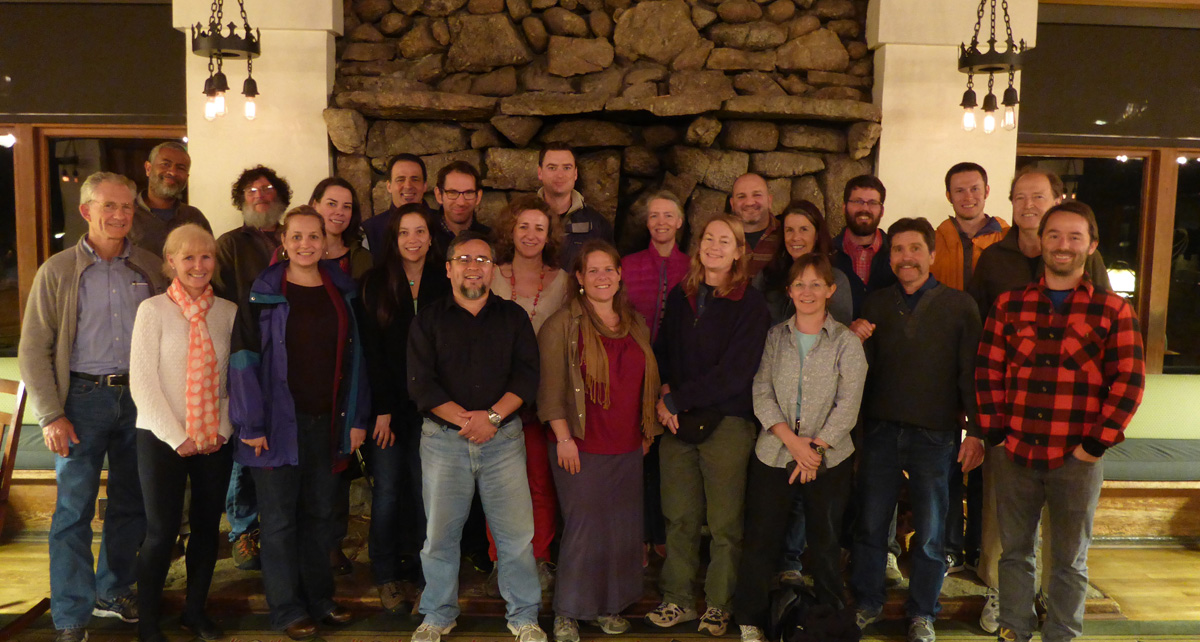About
MSC03 2020
1 University of New Mexico
Albuquerque, NM 87131
Physical Location:
CERIA Building
Room 204
Phone: (505) 277-1358
Fax: (505) 277-1351
cookjose@unm.edu
MSC03 2020
1 University of New Mexico
Albuquerque, NM 87131
Physical Location:
CERIA Building
Room 204
Phone: (505) 277-1358
Fax: (505) 277-1351
cookjose@unm.edu

AIM-UP! Annual All-hands Meeting
26 February – 2 March 2014
Asilomar Conference Center, Pacific Grove, California,
Host: University of California-Berkeley
AAAS’s Vision and Change in Undergraduate Biology Education (http://visionandchange.org/)
1. Museum Specimens: A Nexus for Bioinformatics and BigData
Specimens provide a powerful entry into concepts related to space, time, morphology, variability, repeatability
2. The Challenge of Integration (Sound Science, Innovative Pedagogy, and Advanced Instructional Technology)
New curricular materials must be scientifically AND pedagogically valid and should take advantage of innovative teaching technologies.
3. The Dissemination Challenge
New curriculum materials must be accessible to and adaptable by a wide range of faculty in diverse institutions. Where do we want to disseminate materials? Publications in educational journals? Specific educational meetings to attend? Integrating modules into courses at our institutions? ASM workshop? SSE workshop? Others?
4. Next steps
The new “Improving Undergraduate STEM Education” (IUSE) program at NSF.
Travel day arrive, check-in at Asilomar Conference Center
Phone: (888) 635-5310
08:30-09:00 - Welcome and introductions (Eileen), Pre-Evaluation (assign 2 “scribes” for the day)
09:00-09:30 - Update AIM-UP! (Joe, Eileen)
09:30-9:50 - Overview of Educational Modules (Kayce)
9:50-10:00 - Overview of NSF Education Efforts (Scott)
10:00-10:15 - Coffee Break
10:15-11:15 - Climate Change & Museums (Charles Marshall)
11:15-12:00 - Discussion of Climate Change & Museums and goals for meeting
12:00-13:30 - Lunch
13:30-13:50 - Lightning Talk: A museum-based course at U Florida (Pam and Doug Soltis)
13:50-14:05 - Morphology and genetics module-Tali Hammond
14:05-15:00 - Introduce potential topics for module working groups (Steffi)
15:00-15:15 - Coffee Break
15:15-15:30 - Discussion of possible modules---Climate Change & Undergraduate Education
15:30-16:30 - First Round of 4 Module Breakouts (assign leader and scribe)
16:30-17:00 - Wrap up and other thoughts (discuss Pete’s potential)
18:00-19:00 - Dinner at Asilomar
08:30-09:15 - Overview Day 1, Update for day 2
Discussion of goals for workshop (revise Sat agenda?)
New topics, expected outcomes
Brainstorming: ideas for sequential (?) teaching modules
09:15-10:15 - 4 subgroups (continue modules –same leader, shuffle others)
10:15-10:30 - Subgroup reports and suggestions (5 minutes each)
10:30-10:45 - Coffee break
10:45-11:00 - Discussion of publication: Climate Change & Museums
11:00-12:00 - Network evaluation & student participation (Eileen)
Update on IRB, surveys to date
Plan for surveys (e.g., before/after, types of courses)
Discussion of survey questions and other evaluation efforts
12:00-15:30 - Lunch & Fieldtrip
15:30-15:50 - Students working in natural history collections-What is the impact? (Anna Monfils)
15:50-16:30 - 10 minute Summaries from 4 working groups
16:30-17:30 - Outcomes for the day, plans for tomorrow
19:30-20:30 - Dinner at Asilomar
08:30-09:00 - Summary of day 2 and plans for day 3 (assign “scribes”)
9:00-9:45 - Second Discussion of Publication: Climate Change & Museums
09:45-10:00 - Coffee Break
10:00-12:00 - Teacher Workshop – implementing demo modules
12:00-13:30 - Lunch
13:30-14:30 - Discussion and summary how did we do?
14:30-16:00 - Summary and next steps (working groups, workshops, etc)
17:00-19:00 - Dinner at Asilomar
Departure from Asilomar
AAAS’s Vision and Change in Undergraduate Biology Education (http://visionandchange.org/)
Potential Topics for discussion:
1. Museum Specimens: A Nexus for Bioinformatics and BigData
Specimens provide a powerful entry into concepts related to space, time, morphology, variability, repeatability
2. The Challenge of Integration (Sound Science, Innovative Pedagogy, and Advanced Instructional Technology)
New curricular materials must be scientifically AND pedagogically valid and should take advantage of innovative teaching technologies.
3. The Dissemination Challenge
New curriculum materials must be accessible to and adaptable by a wide range of faculty in diverse institutions. Where do we want to disseminate materials? Publications in educational journals? Specific educational meetings to attend? Integrating modules into courses at our institutions? ASM workshop? SSE workshop? Others?
4. Next steps
The new “Improving Undergraduate STEM Education” (IUSE) program at NSF.